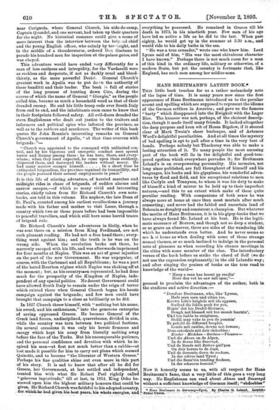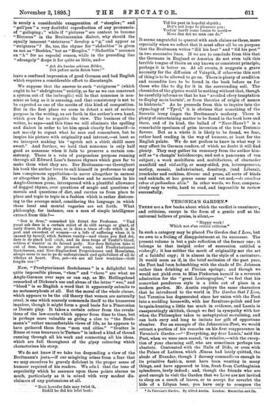HANS BREITMANN'S LATEST BOOK.* THIS little book touches for us
a rather melancholy note of the lapse of time. It is many years now since the first appearance of Hans Breitmann introduced us to the peculiar accent and spelling which are supposed to represent the idioms of the German settlers in America ; and gave us the famous " barty " which disappeared into the Ewigkeit with the Lager Bier. The humour was not, perhaps, of the choicest descrip- tion, though it made itself many friends. It lacked altogether the deep purpose and keen wit of Hosea Bigelow, if it steered clear of Mark Twain's sheer burlesque, and of Artemus Ward's delightful peculiarities. And at all times the mystery of bad spelling is apt to pall after a time in the very best of hands. Perhaps nobody but Thackeray was able to make a lasting attraction of it. To many people the most amusing part of the book will lie in the delightful and good-tem- pered egotism which everywhere pervades it ; for Breitmann Leland's is an overpowering personality. His memoirs, not long since published, are full throughout of himself and his languages, his books and his gipsyisms, his wonderful adven- tures by flood and field, and his exceptional relations to men like Carlyle and Tennyson, to whom it was his duty to make of himself a kind of mirror to be held up to their imperfect natures,—and this to an extent which make of them quite peculiar reading. With companions of both sexes he was always more at home at once than most mortals after much consorting ; and never had the fabled and uncertain land of Bohemia so doughty and consistent a champion. But whatever the merits of Hans Breitmann, it is in his gipsy-books that we have always found Mr. Leland at his best. He is the legiti- mate successor of Borrow, and though not so deep a student, or so grave an observer, there are sides of the wandering life which he understands even better. And he never seems so
mu h at home as when dealing with some of those strange
nomad themes, or so much inclined to indulge in the personal note of pleasure as when recording his chance meetings in the cities with some member of the clan. The introductory verses of the book before us strike the chord of Self (we do not use the expression unpleasantly) in the old Lelandic way ; and after singing the praises of books as the true road to knowledge of the world-
" Many a man has learnt py readin' More dan vot he saw mit eyes,"—
proceed to proclaim the advantages of the author, both in the studious and active direction :—
"Derefore Breitmann, who, like 'Lysses,
Hafe seen men and cities too, Known Life's heighds mit ids apysses, Scribad dis liddle pock for you, Hopin' dat his Drafel-Bictures, Dough not blessed mit too moosh learnin', Und too liable to strigtnres, Shdill may vake in you de yearnin' To pehold de different beoples, - Lands mit castles, downs mit towers; Dom-catedrals mit deir shdeebles ;
Kinder - Illadchen - Gartens—Vlowers- Und die Ahnen on de Alpen, In de Sonne like Smaragd, Und de Roads mit Reiters gall'pen On deir horses to de Jagd,
Und de dorrents down de rockses,
In der schiinz land Tyrol ;
Und die Senn'rin tending flockses, In der schwarze kamisol."
Now it honestly seems to us, with all respect for Hans
Breitmann's fame, that a very little of this goes a very long way. No Englishman can read about Ahnen and Smaragd without a sufficient knowledge of German itself; " shdeebles" • Hans Breitmann in Germany—Tyrol. By charley Leland. .110.
Netter thrwit. - is surely a considerable exaggeration of " steeples ; " and " gall'pen " a very doubtful reproduction of any pronuncia- of " galloping ;" while if " pictures " are content to become "Bictures" in the Breitmannian dialect, why should the equally innocent "strictures" develop a "g," and appear as "strigtures " ? So, too, the rhyme for "shdeebles " is given us not as "Beobles," but as "Beoples." " Shdartlin " assumes an " h " for no especial reason, while in the preceding line " sdrangely " drops it for quite as little, and-
" Ach die bunten schonen Hader, Dot peforo mein fision bass !"
leave a confused impression of good German and bad English which requires a considerable effort to disentangle.
We suppose that the answer to such " strigtures " (which ought to be " shdrigtures " strictly, as far as we can construct a system out of the imbroglio) will be that nonsense is non- sense so long as it is amusing, and that consistency is not to be expected as one of the merits of this kind of composition. But in the first place we seem to detect a sort of serious purpose in the writing, as set forth in the author's own hand, which goes far to negative the view. The business of the writer, he says—and this time we will eliminate the spelling and dialect in order to let him speak clearly for himself—is not me: ely to repeat what he sees and remembers, but to inspire his picture with originality and interest,—at least so we interpret making his " sgetch mit a sbirit shdill more sweet." And further, we hold that nonsense is only half good as nonsense when it fails to preserve a certain con- sistency. There is a vein of purposeless purpose running through all Edward Lear's famous rhymes which goes far to make them what they are. Der Breitmann—as throughout his book the author loves to call himself in preference to any less conspicuous appellation—is never altogether in earnest or altogether in joke. He teaches and he moralises in his Anglo-German prose, interspersed with a plentiful allowance of doggrel rhyme, over questions of magic and questions of morals and questions of diet, and carries us from place to place and topic to topic in a fashion which is rather distress- ing to the average mind, considering the language in which these local and mental vagaries are set forth. What philosophy, for instance, can a man of simple intelligence extract from this ?—
"Dot is drue," remarked his frient der Professor. " Und yoost ash dere is a certain relict of de oldt savage or giant, of early dimes, in efery man, so is dere a trace of—de witch In de pest and sweedest of women—or a lofe of suffering when it is caused by herself, witch flatters vanity—und vhere you find dot, dere is de plack hell vitcb, and de dree trops of Teufel's blood, seldom a' wantin' in de fairest pody. Nor does Religion take it out of dem, because de piousest nuns, und Presbyterianest Scotchesses, und New-Englandest Proprietesses und Moralistes, alvays seem to me to pe de unforgivinest und spitefullest of all de vitches at heart. -Nun, gut—we are all boor wretches—Gott forgife oos ! "
Now, "Presbyterianest Scotchesses" is a delightful but quite impossible phrase, " vhen" and "vhere" are what no Anglo-German ever says or can say, as Mr. Hollingshead remarked of Dickens's use and abuse of the letter " wee," and "blood" is so English a word that it apparently submits to no metamorphosis at all. Bat the moral of the whole clause, which appears to be the old theory that women are naturally cruel, is one which scarcely commends itself to the humorous inquirer, though it might form a good basis for a Pineronian or Ibsenic play. It takes a certain colour from the revela- tions of the law-courts which appear from time to time, but is perhaps more valuable as giving a clue to "the Breit- mann's " rather uncomfortable views of life, as he appears to have gathered them from "men and cities." " Grattez le Russe et vous trouverez le Tartare" is indeed a kind of thread running through all his work and connecting all his ideas, which are full throughout of the gipsy colouring which characterises his story.
We do not know if we take too desponding a view of the Breitmann's jests,—if our misgiving arises from a fear that we may ourselves be gravely deficient in the proper sense of humour required of his readers. We adni that the tone of superiority which he assumes upon these points alarms us ranch, particularly as it is mixed with very modest dis- claimers of any pretensions at all.
" Boot howefer fate may twist it, Shdill he did his lefel best : Tid his pest in hopeful shpirit ;
Dot's mit hope to pleasure you : Vorkin' hardt some braise to merit—
More dan dot no man can do."
It seems ungrateful to quarrel with such claims as these, more especially when we reflect that it must after all be on purpose that the Breitmann writes "did his best" and " tid his pest"
in two successive lines. If we are to conclude from this that the Germans in England or America do not even talk this terrible tongue of theirs on any known or consistent principle, perhaps it is better so. At all events, it suggests a grave necessity for the diffusion of Volapiik, if otherwise this sort of thing is to be allowed to go on. There is plenty of erudition and recondite lore to be found in the book before us for those who like to dig for it in the surrounding soil. The chronicles of the gipsies would be nothing without that, though he carefully informs us that he has " avoided efery temptation to display mein learnin', or from theories of origin of names in hishtorie." As he proceeds from this to inquire into the etymology of "Tyrol," it is obvious that something of the Socratic irony tinges the Breitmann's modesty. There is plenty of entertaining matter to be found in the book here and
there, and of its kind, the ballad of "Narr-Haus'1" is a. remarkable specimen of grim invention of the true Teutonic flavour. But as a whole it is likely to be found, we fear, rather hard reading in the way of humour, at least for the English palate. We do not profess to know in what way it may affect its German readers, of which no doubt it will find plenty. They may gather its summary from the author him- self as "a changin' kaleidoscope, und not a panorama of von subject ; a work multiform and multifarious, of characder manifold and viel-seitig, or many-sided, yea, heteorgeneous, motley, mosaic, indiskriminat, desultory, (und Liberal), irreckular and reckless, diverse und prose, all sorts of kinds und unkinds, et hoc genus omne and vot nod,—de omnibus rebus et quibusdam aliis." In other words, we fear, compara- tively easy to write, hard to read, and impossible to review successfully.



















































 Previous page
Previous page